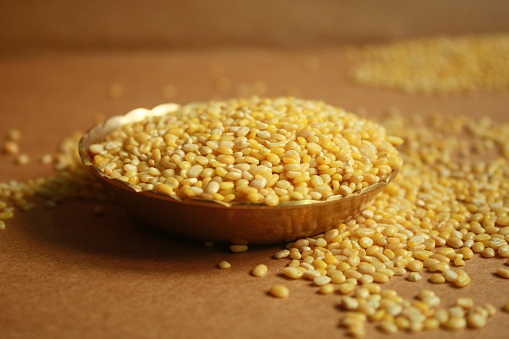Yellow moong dal, also known as mung beans or green gram, is a type of legume that is widely consumed in India and other parts of Asia. It is a small, oval-shaped bean that is green in its natural state but turns yellow when it is hulled and split. Yellow moong dal is highly nutritious and has a number of health benefits, making it an excellent choice for inclusion in a healthy diet.
One hundred grams of yellow moong dal contains approximately 350 calories, 60 grams of carbohydrates, 25 grams of protein, and 1 gram of fat. It is also an excellent source of fiber, providing about 12 grams per 100 grams. In addition to these macronutrients, yellow moong dal is rich in a number of micronutrients, including iron, potassium, and vitamin B6.
One of the key health benefits of yellow moong dal is its high protein content. Protein is an essential nutrient that is necessary for the growth, repair, and maintenance of tissues in the body. It is also necessary for the production of enzymes, hormones, and other molecules that are involved in a variety of bodily functions. Consuming an adequate amount of protein is especially important for vegetarians and vegans, who may not get enough of this nutrient from animal sources. Yellow moong dal is an excellent plant-based source of protein that can help individuals meet their protein needs.
Another important benefit of yellow moong dal is its high fiber content. Fiber is a type of carbohydrate that is not digested by the body and passes through the digestive system largely unchanged. It is classified into two types: soluble and insoluble. Soluble fiber dissolves in water and forms a gel-like substance, while insoluble fiber does not dissolve in water. Both types of fiber are important for maintaining a healthy digestive system and preventing constipation. Yellow moong dal is a good source of both soluble and insoluble fiber, making it an excellent choice for maintaining regular bowel movements and overall digestive health.
In addition to its protein and fiber content, yellow moong dal is also rich in a number of other micronutrients that are important for overall health. For example, it is an excellent source of iron, which is necessary for the production of red blood cells and the transportation of oxygen throughout the body. It is also a good source of potassium, which helps to regulate blood pressure and maintain healthy heart function. Finally, yellow moong dal is a good source of vitamin B6, which is necessary for the metabolism of proteins and carbohydrates and is also important for brain function.
Overall, yellow moong dal is an extremely nutritious and healthy food that can be included in a wide variety of dishes. It can be used in soups, stews, curries, and even as a vegetarian protein source in dishes such as veggie burgers. Its high protein and fiber content, along with its rich micronutrient profile, make it an excellent choice for those looking to improve their overall health and well-being.

 Home
Home Health
Health Diet & Nutrition
Diet & Nutrition Living Well
Living Well More
More












